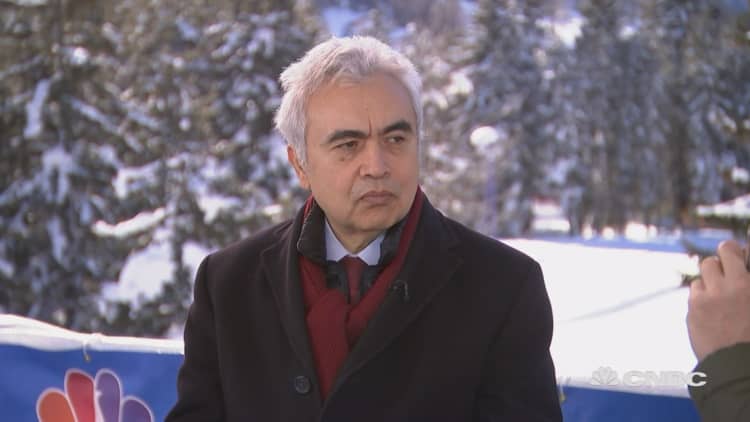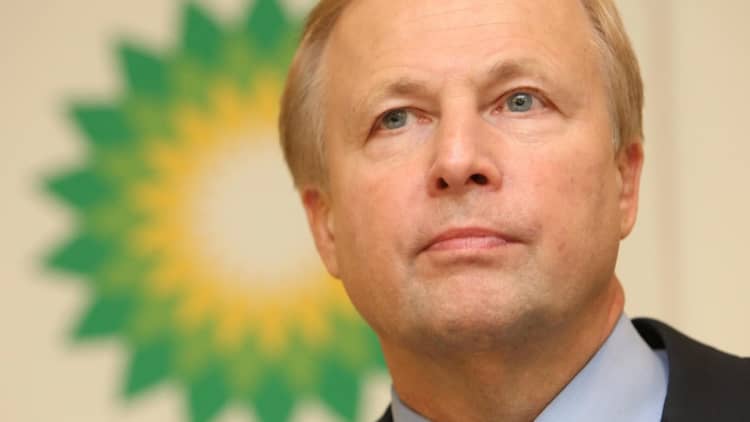Oil prices tumbled on Tuesday as China posted its weakest economic expansion in nearly three decades and the IMF revised its global growth forecast lower, raising fresh concerns about fuel demand.
Crude futures and equities came under renewed pressure in afternoon trading after the Trump administration canceled a meeting with Chinese counterparts to advance trade negotiations.
U.S. West Texas Intermediate crude futures ended Tuesday's session down $1.23, or 2.3 percent, to $52.57. Brent crude, the international benchmark for oil prices, dropped $1.20, or 1.9 percent, to $61.54 just before 2:30 p.m. ET.
WTI earlier touched a fresh six-week high above $54 a barrel. Both WTI and Brent have posted three straight weeks of gains, rising 18 percent and 20 percent, respectively, through last Friday.
But futures gave back some of last week's gains on Tuesday as trading got back underway following the Martin Luther King Jr. holiday in the United States.
The IMF on Tuesday cut its outlook for global economic growth in 2019 to 3.5 percent, down from an early forecast of 3.7 percent.
"It seems a distinct amount of economic concern is rising up, compounded by the IMF report that came out showing a downward revision to economic growth," said Matt Smith, head of commodity research at tanker-tracking firm ClipperData.
Fears of a slowing global economy have stoked concern about faltering demand for fuel. The fears have largely been driven by an ongoing trade dispute between the United States and China, the world's two biggest economies and top oil consumers.
The Trump administration has canceled a meeting among the U.S. Treasury Department, the United States Trade Representative and Chinese vice minister of finance scheduled for this week, a source told CNBC. The move came as progress on negotiations over intellectual property protections stalled and Washington sought a better deal from Beijing, the source said.

On Monday, China reported its official economic growth rate was 6.6 percent in 2018, the weakest reading since 1990. Meanwhile, South Korea's economy grew by 2.7 percent last year, the slowest pace in six years.
China's demand for crude remains robust, according to Smith, but the country's growing role in refining oil into fuels is contributing to an oversupply of petroleum products, particularly gasoline, in Asia.
"You continue to see China pulling in more crude, but at the same time as well, they're' pushing out more products," he said.
"China is a real concern and you are starting to see that showing up in the flows data."
Craig Erlam, senior market analyst at brokerage firm OANDA, said traders appear to be taking advantage of negative headlines to take some profits off the table following crude's recent run-up.
"While in skittish markets this may be enough to further exacerbate downward moves, this looks like nothing more than profit taking with these headlines another convenient reason to do so," he said in a briefing.

Despite the IMF revision and Chinese data, BP expects oil demand to grow by 1.4 million barrels a day this year, CEO Bob Dudley told CNBC on Tuesday.
Dudley says he sees the market tightening and oil prices stabilizing following last quarter's spike to four-year highs and subsequent drop to 18-month lows.
OPEC and 10 other oil exporting nations, including Russia, aim to drain oversupply in the oil market by holding back a combined 1.2 million bpd through June. Last week, OPEC reported that output from the 14-nation producer group dropped sharply in December.
Also the supply side, U.S. shale oil production growth is seen slowing from recent months. The U.S. Energy Information Administration expects output from several shale regions to rise by 62,000 bpd in February. EIA also revised down its projection for U.S. shale production in January by nearly 50,000 bpd.


